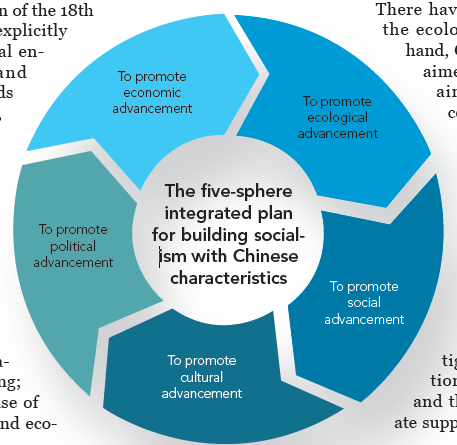China's ecological progress and global sustainable development
 0 Comment(s)
0 Comment(s) Print
Print E-mail China Today, November 22, 2017
E-mail China Today, November 22, 2017
Countries across the globe face the common challenge of sustainable development. It was in 2007 that China first proposed the idea of promoting ecological progress, thereby embedding the concept of sustainable development in the context of human civilization. Ten years on, especially since the convening of the 18th CPC National Congress, China has made considerable headway in its actions as well as advocacy of ecological progress. The country has improved ecological environment management and governance, and also freely shared its experience with other nations.
Bold progress and achievements
Since the 18th National Congress of the CPC, great importance has been attached to incorporating China's ecological progress into every facet of social, political, economic, and cultural development. In this regard, the Chinese government has brought into effect several major policies that have produced significant results.

The theories applicable to ecological progress, newly refined and expressed in plain language, have raised public ecological awareness. It is pointed out, for example, that a healthy ecology nurtures a prosperous civilization, that green mountains are indeed gold mountains, and that the ecological environment is a productive force. During the 18th CPC National Congress, ecology was listed as one of the five indicators to the goal of building a moderately prosperous society in all respects, the other four being the country's politics, economy, culture, and social development. At the Third Plenary Session of the 18th CPC Central Committee, the Party called for the building of a systematic, complete system of ecological progress; and at the Fourth Plenary Session it proposed setting up a legal system specifically to protect the ecological environment. At the Fifth Plenary Session, "green" was designated a key concept for development, equal in importance to innovation, coordination, opening-up, and shared benefits. A complete theoretical system has so far formed with the institution establishment at the core. The system aims to build harmonious relations between humans and nature by strengthening environmental management and promoting ecological culture and green life.
Both the institution and system geared to promoting ecological progress have been basically established. In the Third Plenary Session of the 18th CPC Central Committee, it was explicitly proposed to protect the ecological environment with institutions and deepen systematic reforms towards ecological progress. Soon after, the central government carried out a policy mix (styled "1+6") encompassing an overarching plan for further reforms and six pilots in this regard, in such fields as supervision, accountability, and a natural resources balance sheet. These systems have been either established or improved in eight respects. They include: natural resource property rights; national land space exploitation and protection; space planning; overall management and frugal use of resources; paid use of resources and ecological compensation; environmental governance and an ecological protection market; ecological progress evaluation and assessment; and accountability and legal liability. The eight systems constitute China's fundamental ecological progress institution. Meanwhile, China has formulated or amended laws on environmental protection, atmospheric pollution prevention, water pollution prevention, and soil pollution prevention, all of which signify remarkable progress in the country's legal construction in environmental issues.







Go to Forum >>0 Comment(s)